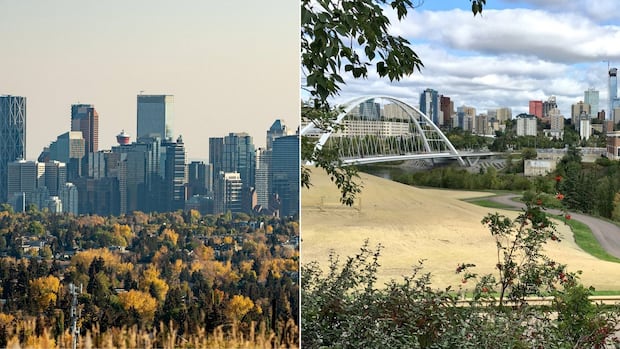It’s no secret Alberta’s population is booming — but a majority of people polled in both Calgary and Edmonton are not too happy with the pace of that growth and what it means for their day-to-day lives.
The latest estimates from Statistics Canada suggest Alberta’s population surpassed five million as of July 1. That number is only expected to climb, with the provincial government projecting the population will grow by roughly two million over the next quarter century.
In polls done for CBC News, Janet Brown Opinion Research asked 1,000 residents in both cities how they would rate the current pace of population growth. The survey was conducted through the Trend Research Online Panel from Oct. 1 to 8.
“What we find is that the majority of people feel their city is growing too fast,” said Janet Brown.
In Calgary, 64 per cent of respondents said the city’s population is growing too fast, 26 per cent said it was about right, and one per cent felt it’s too slow. Eight per cent were unsure or didn’t answer.
It was a similar sentiment in Edmonton, where 62 per cent of respondents said the pace was too fast, 23 per cent about right, two per cent too slow and 13 per cent were unsure or didn’t answer.
The poll also asked respondents in both cities about how recent population growth has impacted them personally.
In Calgary, 51 per cent labelled the impact as negative, while eight per cent said it had been positive. About one third said they had felt no impact and nine per cent did not know or did not answer.
Fifty-six per cent of those in Edmonton called the impact negative. Eight per cent said it had been positive, 27 per cent chose no impact and nine per cent said they did not know or did not answer.
“When you look at those people who are most concerned about the impact of growth, it tends to be people in the age group of like 25 to 45,” said Brown.
“So people who are just starting out, people who are finding it hard to get a foothold in a city where prices are increasing quite dramatically,” said Brown, who noted people with a high school education or less, and those struggling financially, were also more likely to take issue with the growth.
Big city, big problems
“It’s too overcrowded for me,” said Pearl Parchem, who lives in Calgary. “When I moved here, it was a decent-sized city, but I’ve been here for 50 years, [and] growth has been way too much.”
She cited wait times for health services and challenges finding a doctor as some of her frustrations with the increased population.
For Marrisa Atkinson, another Calgary resident, the growth is noticeable when trying to enjoy recreation facilities and activities in the city.
“It’s like trying to win the lottery to book swimming lessons for children,” said Atkinson.
“You can end up at a soccer game for kids and there’s no parking anywhere because we just have an overwhelmingly huge population, and not enough space for everyone.”
Other campaign issues — blanket rezoning, infill housing, construction woes and job market struggles — all have their own ties to the rapid rate of growth both Calgary and Edmonton have seen in recent years.
Colin Cambell, Alberta division president for Mattamy Homes, told Radio Active that crews are keeping busy with new developments. He sees housing and affordability on the forefront for politicians — and he hopes it stays that way.
LISTEN | Home construction is booming in Alberta:
Radio Active6:09Home construction is booming in Alberta
This year has been breaking records when it comes to constructing new homes in Alberta. Liam Harrap went out to a new subdivision in Sherwood Park called Hearthstone to find out more.
“We just want to make sure that that is remaining top of mind for all new councils, that Alberta will remain a very desirable place to live, and we don’t want to lose any competitive advantage on affordability,” said Campbell.
Ballot box issue
Look for it, and you will see the word ‘growth’ popping up again and again in the municipal campaigns.
Edmonton mayoral candidate Tim Cartmell says on his website that “Edmonton is growing, and that growth is vital to our city’s future. But how we grow matters.”
Calgary mayoral candidate Jeromy Farkas has said that Calgary could hit the two-million mark even earlier than 2034 as projected, perhaps even before the start of the next decade.
“Calgary has never been good at keeping pace with growth. Over the next four years, one of us on the stage is going to be the mayor to welcome the two-millionth Calgarian,” said Farkas during a mayoral debate Wednesday.
 Calgary’s population is expected to rise beyond two million within the next decade. (CBC News)
Calgary’s population is expected to rise beyond two million within the next decade. (CBC News)
In her polling, Brown found some correlation between those concerned about growth, and which candidate they might be most likely to support.
“People who sort of identify as right-wing on the political spectrum, they’re also more concerned about growth, and they’re also more likely to be supporting mayoralty candidates that are a little more right on the spectrum,” said Brown.
“In Calgary, they’re gravitating toward candidates like [Sonya] Sharp and [Jeff] Davison. In Edmonton, they’re gravitating toward a candidate like Cartmell.”
Whether the frustration with growth is enough to propel any candidate ahead of the pack remains to be seen. Brown’s polls suggests voters in Calgary and Edmonton are largely undecided.
“I think for those people who are really struggling financially, they are going to be looking for candidates to who help solve that problem for them,” said Brown.
“And their decision to vote or not vote is probably going to come down to whether they think there are candidates who do have the right kind of solutions to deal with growth and all the negative things that come with growth.”
CBC News commissioned polls that surveyed 1,000 residents in Edmonton and 1,000 residents in Calgary. They were surveyed through the Trend Research Online Panel from Oct. 1 to 8. Quotas were set for age, gender and city quadrant. Minimal weighting was applied to match Statistics Canada population data. A margin of error does not apply because they were non-probability online surveys. However, a comparable margin of error would be +/-3.1 percentage points, 19 times out of 20.

